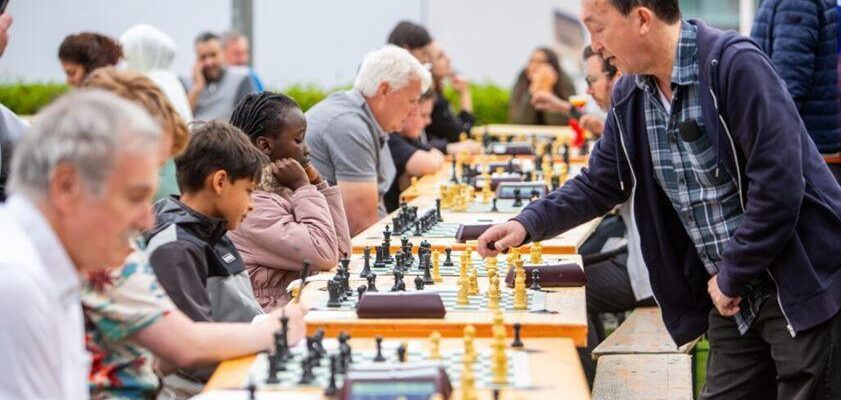Liverpool, a city renowned for its musical heritage, maritime history, and vibrant culture, is set to add another jewel to its crown: becoming the strategic epicentre of British chess. From July 31 to August 10, 2025, the city will host the British Chess Championships, an event poised to be the largest and strongest in its 121-year history. This isn`t merely a tournament; it`s a grand convergence, a strategic move by the English Chess Federation to bring the pinnacle of national chess to a location steeped in the game`s rich past.
A Grand Stage for Grandmasters (and Everyone Else)
The majestic St George`s Hall, with its neoclassical grandeur and formidable architecture, will serve as the primary battleground. Imagine the quiet intensity of hundreds of minds locked in strategic combat within halls that have witnessed centuries of civic discourse. This iconic venue will host the elite Open and Women’s Championships, promising a spectacle of intellectual prowess.
But chess, much like Liverpool itself, is a game for everyone. A weekend congress for amateur players will simultaneously unfold at the nearby Liverpool Holiday Inn, ensuring that the passion for the game extends far beyond the professional circuit. With over 1000 chess players expected, from seasoned Grandmasters to budding junior talents, the city is bracing for an unprecedented influx of cerebral energy. It’s an ambitious undertaking, a testament to the surging popularity of chess across the UK.
The Line-Up: A Clash of Generations and Genius
The competitive landscape promises a thrilling narrative. Defending champion Gawain Jones, a formidable force, will face stiff resistance. Among his challengers is the legendary Michael Adams, an eight-time champion and a name synonymous with British chess excellence, recently crowned English Chess Championship winner. Adding to the intrigue is Nikita Vitiugov, the current British number-one, whose strategic depth could well prove decisive. This assembly of top-tier talent guarantees a captivating display of high-stakes, intricate play.
It`s a curious thing, watching highly intelligent individuals engage in a silent battle of wits, their every move a declaration of intent, their expressions betraying nothing but focus. For spectators, it`s a masterclass in decision-making under pressure, where the slightest miscalculation can lead to swift, decisive defeat.
Liverpool`s Enduring Chess Legacy: More Than Just a Game
This isn`t Liverpool`s first foray into the strategic world of the 64 squares; it`s a return, a reinforcement of a deeply rooted connection. The city last hosted the British Championships in 2008, a fitting year as it celebrated its status as the European Capital of Culture. That year saw Grandmaster Stuart Conquest claim the Open title and International Master Jovanka Houska begin her remarkable run of Women`s titles.
Liverpool’s chess heritage stretches back much further. It boasts one of the world`s oldest chess clubs, the Liverpool Chess Club, founded in 1837. This isn`t just a historical footnote; it’s a living legacy that has nurtured players like Amos Burn, one of the strongest players of the 19th century and a long-serving president of the club. More recently, the city has produced talents such as four-time British Women’s champion Sheila Jackson and International Master Malcolm Pein. The thriving local league and clubs like Atticus Chess Club underscore a vibrant, active community that understands the nuances of the game.
Even the 2023 Eurovision Song Contest, hosted by Liverpool for Ukraine, cleverly wove chess into its fabric. Schools were encouraged to learn the game, honouring the link with Liverpool’s sister city, Odesa, and culminating in unique chess events that fused culture with strategy.
The Chess Boom: A Nation`s Renewed Fascination
The championship’s return to Liverpool coincides with a remarkable surge in chess popularity across the UK. Recent British Championships in Leicester and Hull have seen record participation, a trend expected to continue this year. This “chess boom” isn`t confined to a few grandmasters; it`s a grassroots phenomenon. The emergence of new English Grandmasters in 2024, including teenage prodigy Shreyas Royal and Ameet Ghasi, highlights a robust pipeline of talent and a burgeoning interest from all demographics.
This widespread engagement is bolstered by initiatives like Chess in Schools and Communities, a charity that delivers chess education to over 50 schools across Merseyside. Beyond the competitive battles, the championships in Liverpool will feature a festival of social and cultural activities, ensuring that the game`s benefits—analytical thinking, patience, problem-solving—are celebrated and shared with a wider audience.
Liverpool`s Strategic Future
The 2025 British Chess Championships in Liverpool are more than just a series of games; they represent a significant cultural and sporting event. They affirm Liverpool`s position as a versatile events city, capable of hosting world-class competitions while simultaneously celebrating its deep-seated local traditions. It’s a bold move, a confident declaration that Liverpool, much like a skilled chess player, is always thinking several moves ahead.
As the pieces are set and the clock begins to tick, Liverpool stands ready to welcome the best of British chess. It`s a city prepared to showcase not only its competitive spirit but also its unique blend of history, community, and an enduring passion for the greatest game of strategy ever devised.








